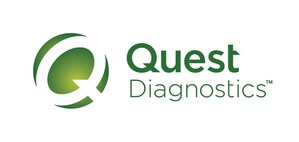Quest Diagnostics to Enhance Diagnosis of Pediatric Neurological Disorders with Exclusive Whole Exome Sequencing from Personalis
Proprietary Neurome™ service provides insight into the genetic causes of neurological disorders so parents and health care providers can develop personalized care strategies
MADISON, N.J., March 10, 2015 /PRNewswire/ -- Quest Diagnostics (NYSE: DGX), the world's leading provider of diagnostic information services, today announced the availability of Neurome™, a whole exome sequencing service designed to aid the diagnosis of rare neurological disorders in pediatric populations. Personalis, Inc., a leading genomics-based diagnostic laboratory, developed and performs the lab-developed test exclusively for Quest Diagnostics.
Neurome is the first whole exome sequencing service available through Quest Diagnostics and its Athena Diagnostics neurology diagnostics business. Whole exome sequencing focuses on the exome, the 1-2% of the human genome that codes for proteins and where most known disease-causing genetic variants occur. As a result, it focuses on the most clinically actionable genomic regions for the individual patient as compared to whole genome sequencing.
Neurome facilitates the diagnosis of ill-defined neurological disorders with a suspected genetic cause, including certain forms of developmental delay, epilepsy and muscular dystrophy. Based on Personalis' proprietary ACE Exome™ technology, Neurome specifically interrogates areas of the genome that affect the nervous system, including clinically interpretable genes as well as certain medically significant non-protein coding regions. Personalis' expert clinical team interprets sequence results based on the patient's neurological signs and symptoms, as described by their healthcare provider in a comprehensive test requisition, and utilizing extensive, curated information on the associations of genes and genetic variants to neurological conditions. The resulting test report provides sequencing findings and their clinical interpretation specific to the patient's suspected disorder.
Neurome is primarily focused on pediatric populations. Genetic neurological disorders typically manifest at an early age and are challenging to diagnose with current methods, such as single gene and gene-panel testing and comparative microarrays. While statistics vary by disease and population, as many as 8% of individuals are identified as having a genetic disorder before reaching adulthood.[i]
Results of whole exome sequencing have been shown to affect patient management, including disease prognosis, family planning and medication choices.[ii]
"Quest Diagnostics is committed to providing clinically actionable insight into disease. The innovative Personalis solution will allow us to deliver on this commitment at a level of quality few whole-exome sequencing methods could match," said Joseph J. Higgins, MD, medical director of Neurology at Quest Diagnostics and a board certified child neurologist. "By revealing the genetic factors responsible for a condition, Neurome will empower parents and health care providers to establish an appropriate treatment and management plan. It will help many of the mothers and fathers now groping in the dark for an answer to the cause of their child's disorder to receive a diagnosis that is reliable and actionable."
At the September 2014 National Society of Genetic Counselors (NSGC) Conference, Personalis presented data that showed its ACE Exome method identified 47 gene variants of significance in 83 patient specimens, for a detection rate (or diagnostic yield) of 57%. This compares to 25% in a study of 504 patients by an alternative whole exome sequencing method.[iii] Whole exome and genome sequencing can miss certain DNA nucleotide bases, the molecules that comprise the genome. ACE Exome compared favorably in "covering" coding DNA bases, at 99% on average (to a depth of 25 or more times), in 31 of 37 of reported genes, compared to 15 / 37 by whole genome sequencing and 13 or 14 / 37 by two standard exome platforms.
"The diagnostic yield of Neurome should exceed current exome tests because of its technical and clinical focus on neurological conditions," added Dr. Higgins. "It's an outstanding addition to our menu of next-generation sequencing services."
"Through this relationship with Quest Diagnostics, significantly greater numbers of practitioners and patients will be able to access our proprietary method for diagnosing the genetic cause of neurological diseases," said John West, chief executive officer, Personalis. "That means far more families may be able to resolve their search for a cause of the condition affecting their loved one."
Through its comprehensive menu of specialized clinical laboratory and information services, the Quest Diagnostics Neurology clinical franchise, which includes Athena Diagnostics, provides actionable insights to help improve disease diagnosis, monitoring and treatment, promoting better health outcomes for people with rare and neurological disorders.
Athena Diagnostics will Showcase Neurome at the 67th American Academy of Neurology Annual Meeting April 18-25 in Washington, D.C. (Booth number 1515).
About Personalis, Inc.
Personalis, Inc. provides advanced genome-scale sequencing and interpretation services for inherited genetic disease and cancer. Personalis performs Neurome, a lab-developed test, at its CLIA-certified, CAP-accredited laboratory in Menlo Park, California.
For more information please visit www.personalis.com.
About Quest Diagnostics
Quest Diagnostics is the world's leading provider of diagnostic information services needed to make better healthcare decisions. The company offers the broadest access to diagnostic information services through its network of laboratories and patient service centers, and provides interpretive consultation through its extensive medical and scientific staff. Quest Diagnostics is a pioneer in developing innovative diagnostic tests and advanced healthcare information technology solutions that help improve patient care. Additional information is available at QuestDiagnostics.com. Follow us at Facebook.com/QuestDiagnostics and Twitter.com/QuestDX.
[i] Baird PA, Anderson TW, Newcombe HB, Lowry RB. Genetic disorders in children and young adults: a population study. Am J Hum Genet1988;42:677-693
[ii] Ann Neurol 2014;76:473–483
[iii] JAMA. 2014;312(18):1870-1879. doi:10.1001/jama.2014.14601.
Quest Diagnostics Contacts:
Wendy Bost, Quest Diagnostics (Media): 973-520-2800
Dan Haemmerle, Quest Diagnostics (Investors): 973-520-2900
Personalis Media Contact:
Maurissa Messier
760.659.6700
[email protected]
Logo - http://photos.prnewswire.com/prnh/20130717/NY48934LOGO
SOURCE Quest Diagnostics
Related Links
http://www.questdiagnostics.com
WANT YOUR COMPANY'S NEWS FEATURED ON PRNEWSWIRE.COM?
Newsrooms &
Influencers
Digital Media
Outlets
Journalists
Opted In




Share this article